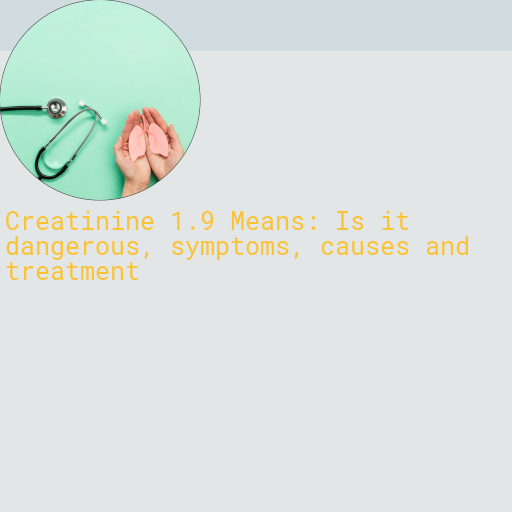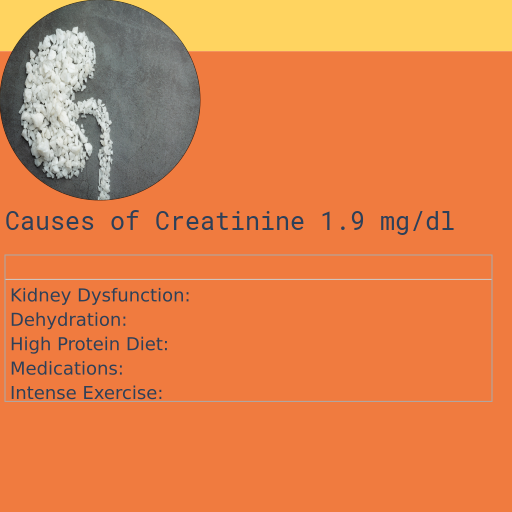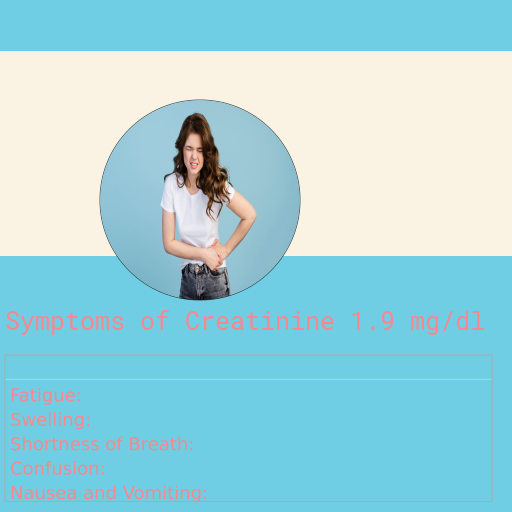Creatinine 1.9 : Is it Dangerous, Causes, Symptoms and More
When it comes to understanding kidney health, one of the key metrics often discussed is the level of creatinine in the blood. Elevated creatinine levels, such as a reading of 1.9, can be a cause for concern and may indicate underlying health issues. This blog delves into the potential dangers associated with high creatinine levels, exploring the common causes and symptoms you should be aware of. Whether you're experiencing symptoms yourself or are just keen to learn more about kidney health, understanding these aspects is crucial for early detection and effective management.

What is Creatinine
Creatinine is a byproduct of protein breakdown that is produced by the muscles and released into the bloodstream. As a waste product, it has no use in the body and needs to be filtered out by the kidneys. Regular kidney function ensures that creatinine is efficiently removed from the blood and excreted in the urine. Elevated levels of creatinine, such as a reading of 1.9, can indicate potential issues with kidney function, as the kidneys may not be effectively eliminating this waste product from the body.
- Muscle Metabolism: Creatinine is a byproduct of creatine phosphate, which is found in muscles.
- Meat Consumption: Eating meat, especially red meat, can increase creatinine levels as it contains creatine.
- Protein Supplements: High-protein supplements can elevate creatinine due to increased muscle mass and metabolism.
- Exercise: Intense physical activity leads to muscle breakdown, releasing more creatinine into the blood.
- Medications: Certain drugs, like NSAIDs and ACE inhibitors, can impact kidney function, affecting creatinine levels.
- Dehydration: Low fluid intake can concentrate creatinine levels in the blood.
- Kidney Function: Impaired kidney function can lead to decreased clearance of creatinine from the blood.
Normal Range of Creatinine in Adults
The normal range of creatinine levels in adults can vary slightly depending on the laboratory and measurement system used. Generally, for men, the normal range is approximately 0.6 to 1.2 milligrams per deciliter (mg/dL), while for women, it is slightly lower, ranging from 0.5 to 1.1 mg/dL. These values are indicative of healthy kidney function, as creatinine is a waste product produced by muscle metabolism and is typically filtered out of the blood by the kidneys. Elevated levels can signal potential kidney issues or other medical conditions that may require further investigation.
| Age Group | Normal Creatinine Range (mg/dL) |
|---|---|
| Infants (0-1 year) | 0.2 - 0.4 |
| Children (1-12 years) | 0.3 - 0.7 |
| Adolescents (13-18 years) | 0.5 - 1.0 |
| Adult Women (19+ years) | 0.5 - 1.1 |
| Adult Men (19+ years) | 0.6 - 1.2 |
| Older Adults (60+ years) | 0.6 - 1.3 |
Causes of Creatinine 1.9
Elevated creatinine levels, such as 1.9, can be a cause for concern as they may indicate underlying health issues. Creatinine is a waste product produced by muscles and filtered out by the kidneys. When the kidneys are not functioning properly, creatinine can accumulate in the blood. Common causes of elevated creatinine include chronic kidney disease, dehydration, and certain medications that affect kidney function. It's essential to identify the root cause to manage and treat elevated creatinine levels effectively.
- Kidney Dysfunction: Acute or chronic kidney conditions can impair the kidneys' ability to filter waste, leading to elevated creatinine levels.
- Dehydration: A significant drop in body fluids can reduce blood flow to the kidneys, causing a rise in creatinine.
- High Protein Diet: Consuming large amounts of protein can result in increased creatinine production.
- Medications: Certain drugs, such as nonsteroidal anti-inflammatory drugs (NSAIDs) and some antibiotics, can affect kidney function and elevate creatinine.
- Intense Exercise: Vigorous physical activity can cause muscle breakdown, leading to higher creatinine levels.
- Diabetes: Poorly controlled diabetes can damage the kidneys over time, resulting in elevated creatinine.
- High Blood Pressure: Chronic hypertension can impair kidney function, leading to increased creatinine levels.
- Urinary Tract Obstruction: Conditions like kidney stones or an enlarged prostate can block urine flow, causing creatinine to rise.

Symptoms of Creatinine 1.9
When creatinine levels are elevated, it often serves as a red flag indicating potential kidney dysfunction. Symptoms of elevated creatinine can manifest in various ways, and they are not always immediately obvious. Common indications include fatigue, swelling in the extremities, and changes in urination patterns, such as decreased frequency or foamy urine. In more severe cases, individuals might experience nausea, shortness of breath, or itching. Recognizing these symptoms early on is crucial for timely intervention and management of the underlying causes.
- Fatigue: Elevated creatinine levels can cause a general feeling of tiredness and lack of energy.
- Swelling: You may notice swelling, especially in the face, hands, feet, and ankles, due to fluid retention.
- Shortness of Breath: Difficulty breathing can occur as fluid builds up in the lungs.
- Confusion: High creatinine can affect cognitive function, leading to confusion or difficulty concentrating.
- Nausea and Vomiting: Elevated levels may cause gastrointestinal disturbances such as nausea and vomiting.
- Chest Pain: This may be a sign that creatinine levels are affecting heart function.
- Decreased Urine Output: Reduced urine output can be a direct result of kidney dysfunction.
- High Blood Pressure: Elevated creatinine levels can be associated with increased blood pressure, putting extra strain on the heart and kidneys.

Dangers of Creatinine 1.9
While creatinine itself does not directly harm the body, elevated levels of this waste product can be a significant indicator of underlying health issues, particularly related to kidney function. High creatinine levels may signal that the kidneys are not efficiently removing waste, which can lead to a buildup of other harmful substances such as urea. These toxins can cause a range of adverse effects on the body, including fatigue, nausea, and more severe complications. Understanding the implications of elevated creatinine is crucial, as it often points to potential kidney failure or other serious conditions that require medical attention.
- Kidneys: Elevated creatinine levels can indicate impaired kidney function, leading to chronic kidney disease or acute kidney injury.
- Heart: High creatinine levels are often associated with cardiovascular diseases, increasing the risk of heart attacks and strokes.
- Liver: Although less common, elevated creatinine can sometimes signal liver dysfunction or cirrhosis, as the liver also plays a role in metabolizing creatinine.
- Muscles: High creatinine may result from muscle disorders like rhabdomyolysis, where muscle tissue breaks down and releases creatinine into the bloodstream.
- Lungs: Kidney dysfunction leading to fluid retention can cause pulmonary edema (fluid in the lungs), resulting in breathing difficulties.
- Brain: Elevated creatinine levels can lead to neurological issues such as confusion, drowsiness, and even seizures in severe cases.
- Bones: Chronic kidney disease can lead to bone mineral disorders, causing bones to become weak and brittle.
- Gastrointestinal System: High creatinine levels can cause nausea and vomiting, impacting overall digestive health.
Home remedies for Creatinine 1.9
Disclaimer: Elevated creatinine levels cannot be adequately treated at home and require professional medical attention. While basic supportive care such as maintaining a healthy diet, staying hydrated, and avoiding strenuous activities can help manage overall kidney health, these measures are not substitutes for professional diagnosis and treatment. Always consult with a healthcare provider to address any underlying health issues contributing to high creatinine levels.
- Stay Hydrated: Ensure you drink plenty of water throughout the day to help your kidneys flush out toxins more effectively.
- Monitor Your Diet: Focus on a renal-friendly diet, which includes reducing sodium, potassium, and protein intake to lessen the burden on your kidneys.
- Avoid Over-the-Counter Pain Medications: Non-prescription painkillers like NSAIDs can be harmful to your kidneys, so consult your doctor before taking any medication.
- Engage in Regular Exercise: Maintain a healthy lifestyle by incorporating moderate physical activity, which can improve overall kidney function and control other health conditions like diabetes and hypertension.
- Manage Blood Pressure and Blood Sugar: Keep your blood pressure and blood sugar levels under control through medication, diet, and lifestyle changes, as both are crucial for kidney health.
Treatment for Creatinine 1.9
When a creatinine level of 1.9 is detected, seeking medical treatment from a doctor is crucial. The primary goals of treatment include stabilizing kidney function, which can be achieved through various methods such as adjusting medications and monitoring fluid intake. Additionally, it is essential to stop harmful drugs that may be contributing to kidney damage. Physicians may also focus on treating underlying infections that could exacerbate kidney issues. By addressing these factors, doctors aim to manage and possibly improve kidney function, ensuring better overall health outcomes for the patient.
- Hydration: Increasing fluid intake can help dilute creatinine levels in the blood. Drinking plenty of water is often the first step recommended.
- Dietary Modifications: Reducing the intake of protein, sodium, and potassium can alleviate stress on the kidneys. A balanced diet rich in fruits and vegetables is advisable.
- Medications: Doctors may prescribe medications to control underlying conditions such as high blood pressure or diabetes, which can contribute to elevated creatinine levels.
- Lifestyle Changes: Regular exercise, maintaining a healthy weight, and avoiding smoking or excessive alcohol consumption can improve kidney function.
- Monitoring and Regular Check-ups: Frequent monitoring of kidney function through blood tests and regular medical check-ups can help manage and reduce creatinine levels effectively.
GFR with Creatinine of 1.9
When discussing kidney health, it's essential to understand the concept of Glomerular Filtration Rate (GFR). GFR measures how well your kidneys are filtering blood, providing a more accurate picture of kidney function than just the absolute value of creatinine alone. While a creatinine level of 1.9 might raise concerns, it doesn't tell the whole story. The relevance of GFR lies in its ability to account for various factors such as age, sex, and body size, offering a comprehensive assessment of kidney performance. By focusing on GFR, healthcare providers can better diagnose and manage kidney conditions, ensuring more tailored and effective treatment plans.
| GFR Grade | GFR Value (mL/min/1.73 m²) | Kidney Function | Description |
|---|---|---|---|
| G1 | ≥ 90 | Normal or High | Kidney function is normal. No signs of kidney damage. |
| G2 | 60-89 | Mildly Decreased | Mild reduction in kidney function. Often no symptoms, but there may be some early signs of kidney damage. |
| G3a | 45-59 | Mild to Moderate Decrease | Moderate reduction in kidney function. Possible symptoms include fatigue, swelling, and changes in urination. |
| G3b | 30-44 | Moderate to Severe Decrease | Significant reduction in kidney function. Symptoms may become more noticeable, including swelling, fatigue, and changes in urination. |
| G4 | 15-29 | Severely Decreased | Severe reduction in kidney function. Symptoms are likely to be prominent and may include nausea, itching, and difficulty concentrating. |
| G5 | < 15 | Kidney Failure | Kidney function is critically low or absent. This stage is also known as end-stage renal disease (ESRD). Dialysis or kidney transplantation may be necessary. |
What is my GFR for a creatinine of 1.9
| Age | Gender | GFR |
|---|---|---|
| 18 | male | 46.4 ml/m2 |
| 45 | male | 38.53 ml/m2 |
| 60 | male | 36.34 ml/m2 |
| 80 | male | 34.28 ml/m2 |
| 18 | female | 34.43 ml/m2 |
| 45 | female | 28.59 ml/m2 |
| 60 | female | 26.96 ml/m2 |
| 80 | female | 25.44 ml/m2 |
Table of danger posed by Creatinine 1.9 in male across different ages
| Age Group | Is Creatinne of 1.9 dangerous? |
|---|---|
| 25yrs - 95 yrs | bad, and could be dangerous, Consult a doctor |
Table of danger posed by Creatinine 1.9 in female across different ages
| Age Group | Is Creatinne of 1.9 dangerous? |
|---|---|
| 25yrs - 36 yrs | bad, and could be dangerous, Consult a doctor |
| 36yrs - 95 yrs | very high, Consult a doctor immediately |

Which other tests should be done for a creatinine value of 1.9?
When assessing kidney function, it's essential to look beyond just creatinine levels and consider a comprehensive range of tests. For instance, evaluating electrolytes can provide insights into how well the kidneys are managing the body's balance of minerals like sodium, potassium, and calcium. Additionally, a renal profile offers a broader picture by including tests such as blood urea nitrogen (BUN) and glomerular filtration rate (GFR), which can help detect and monitor kidney disease. Furthermore, blood gas levels can reveal how effectively the kidneys are regulating acid-base balance in the body. By integrating these tests, healthcare providers can gain a more complete understanding of kidney health and develop a more accurate and effective treatment plan.
- Electrolytes: This test measures important minerals like sodium, potassium, and chloride in the blood. Imbalances can indicate kidney dysfunction and affect heart and muscle function.
- Renal Profile: A comprehensive set of tests including blood urea nitrogen (BUN), creatinine, and glomerular filtration rate (GFR) to evaluate kidney health and function.
- Blood Gas Levels: This test measures oxygen and carbon dioxide levels in the blood, along with the blood's pH. Abnormalities can indicate issues with kidney function and acid-base balance.
- HbA1c: Hemoglobin A1c provides an average blood sugar level over the past 2-3 months. High levels can affect kidney health and indicate diabetes, a major risk factor for kidney disease.
- Liver Enzymes: Tests such as ALT, AST, and ALP assess liver function. Elevated levels can indicate liver disease, which often coexists with kidney issues and can complicate treatment.

 By: Dr.Bhargav Raut
By: Dr.Bhargav Raut